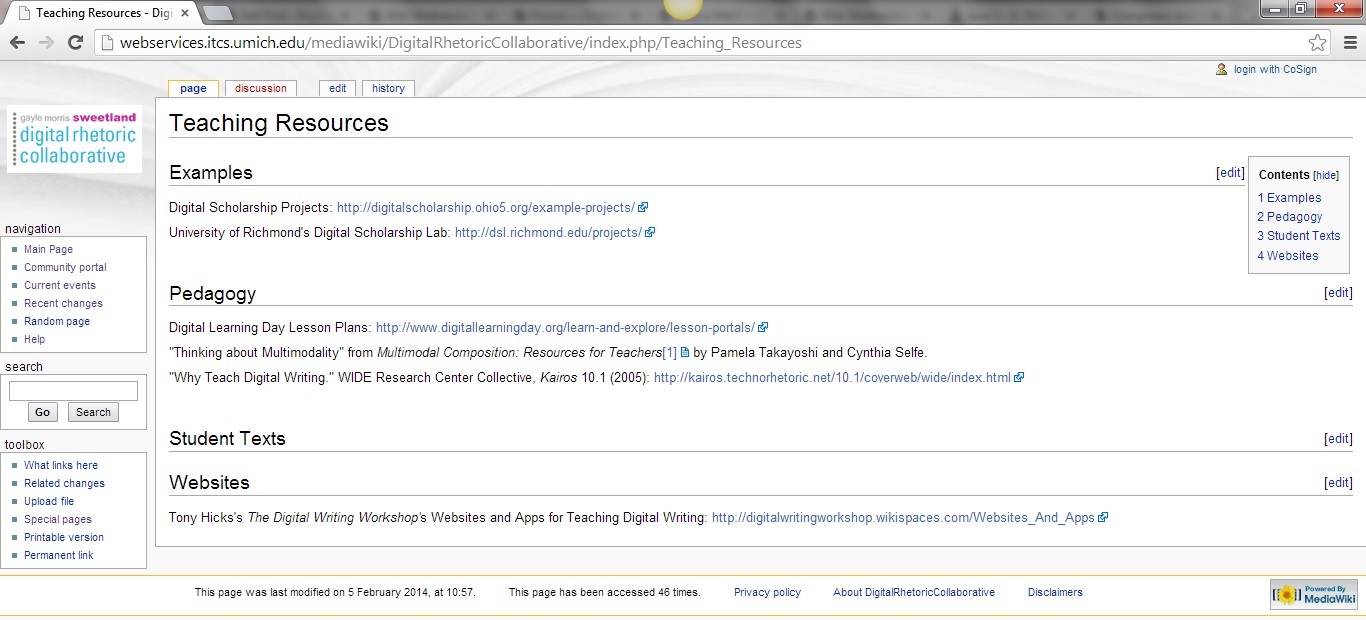Welcome back to Wiki Wednesday! Last week, we inaugurated midweek as Wiki Wednesdays at the Digital Rhetoric Collaborative. This week, we’re talking about ways that you can contribute to the DRC Wiki effort to develop the Wiki as a resource for scholars in the fields of digital rhetoric, computers and composition, composition studies, and other related fields.
DRC Wiki Home Page
DRC Wiki Purposes and Audiences
We’re developing the Wiki as one means of representing the histories of digital rhetoric and computers and writing/composition, as well as their intersections with pedagogy, digital humanities, and more.
We’re hoping this site can be helpful to a number of audiences:
- Students: We hope the Wiki helps students negotiate the fields of digital rhetoric and humanities, to identify key pieces of related scholarship, and to understand where the work of computers and writing takes place, what journals publish material related to digital rhetoric and digital humanities, where conversations about these topics take place, and so forth.
- Instructors: We’re hoping that the Wiki can help instructors point students to a place for content–and for the hands-on building of digital content, as well as to provide resources helpful for proposing new courses and developing curricula, and more. Check out our developing collection of DRC Wiki Teaching Resources.
- Administrators: We aim to collect content where administrators could find stories about the formation of digital rhetoric programs, how digital media affect education, how to provide institutional support of digital literacy, and where students go to study these topics.
These are some of the audiences and purposes we see for the DRC Wiki. Because this is a big task, we’re asking for your help: We’re asking for you to become a Friend to the DRC Wiki!

DRC Wiki Teaching Resources
Five Ways You Can Be a Friend to the DRC Wiki
- Become a Wiki Editor! See our call for DRC Wiki Editors.
- Teach with the DRC Wiki. Maybe you’re teaching a digital rhetoric class or a class that’s talking about wikis or public writing. Have your students look at the DRC Wiki. Encourage them to become editors.
- Leave us a comment on this post about ways we could improve the wiki. Maybe you’ve got ideas about items we should include or ways we should be thinking about the wiki; if so, please let us know! We welcome your feedback!
- Tell us here in what ways you’ve participated in the history of digital rhetoric, computers and composition, digital composition pedagogy, digital humanities, or any of the intersecting fields. Did you attend one of the first 7Cs meetings? Were you part of the creation of the Computers and Writing conference? Let us know!
- Know of great resources for digital rhetoric, computers and composition, composition studies, etc., such as a website like Michael Day’s Computers and Writing Memorabilia Project (CWMP), a project like Jim Ridolfo’s MLA JIL Firsts, a book like Computers and the Teaching of Writing in American Higher Education, 1979-1994: A History by Gail Hawisher, Paul LeBlanc, Charles Moran, and Cynthia Selfe, or the podcast Steve Krause created for his class? Tell us about it here–or on our forum.
We’ll also be talking about our work in developing this history in the DRC Wiki at Computers and Writing 2014 this June. Hope to see you there!
Check back with us next week for another Wiki Wednesday!

